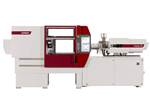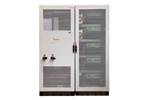Temperature Controller Accepts Renewable, DC Power
Wittmann’s newest temperature controller — the Tempro plus DC — can use direct current (DC) power generated by solar panels without conversion loss.
Share
Read Next
Wittmann has extended the direct current (DC) power capabilities first added to specific injection molding machines and robots to its line of temperature control units (TCUs). Announced at its Competence Days event, the Tempro plus DC temperature controller can directly apply DC power generated by solar without conversion loss.
Wittmann notes that renewable energy sources, including solar and wind, are all generated in DC form, while the standard power supply is alternating current (AC), requiring transformers to be used to enable the use of alternative energies. For electricity’s transport and distribution, DC is transformed into AC and, in some cases, converted back to DC at the point of consumption.
During these regular conversions, some of the power is lost, lowering overall energy efficiency. The creation of DC networks parallel to the existing AC power supply, however, enables direct use of the generated and unconverted DC power. Wittmann says the conversion losses still incurred on the way from an in-house photovoltaic system through direct voltage converters to the processing machine are “absolutely minimal” by comparison.
The new Tempro plus DC can achieve the same performance rates as the equivalent AC-powered models. At Competence Days, the Tempro plus D90 DC presented is suitable for temperatures of up to 90°C, with a heating capacity of 9 kW and 750 V DC. The cooling capacity is 40 kW for a differential temperature of 75 K.
The DC version comes with a 1.1-kW synchronous motor and an inverter as part of the standard equipment package. The motor drives a sealless submersible pump with a maximum working pressure of 7.5 bar and a maximum flow quantity of 60 L/min. In cavitation-free operation, practical values of up to 40 L/min (10.6 gpm) and 5 bar (72.5 psi) are reached. The inverter enables direct connection to the machine’s interim circuit, as well as speed control as determined by the process parameters. Wittmann says the result is a two-fold increase in energy efficiency, with direct power supply via DC vs. AC providing efficiency and profitability increases of up to 15%.
At K2022, Wittmann debuted a DC-powered all-electric EcoPower injection molding machine and a WX series robot, also directly supplied with DC current via a joint interim circuit.

Wittmann extended its DC-powered capabilities to the Tempro plus lines of temperature controllers. Source: Wittmann
Related Content
-
How to Reduce Sinks in Injection Molding
Modifications to the common core pin can be a simple solution, but don’t expect all resins to behave the same. Gas assist is also worth a try.
-
System Offers 'Lights Out' Mold-Channel Cleaning & Diagnostics
New system automatically cleans mold-cooling lines—including conformal channels—removing rust and calcium, among other deposits, while simultaneously testing for leaks, measuring flow rate and applying rust inhibitor.
-
Temperature Control Units on Display at PTXPO
technotrans says climate protection, energy efficiency and customization will be key discussion topics at PTXPO as it displays its protemp flow 6 ultrasonic eco and the teco cs 90t 9.1 TCUs.
















